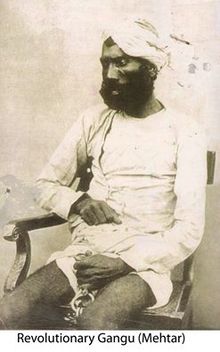| Gangu Valmiki/Mehtar (Gangu Baba) | |
|---|---|
 Gangu Baba just before being hanged on 8th Sept.1859 in Chunniganjh, Kanpur Gangu Baba just before being hanged on 8th Sept.1859 in Chunniganjh, Kanpur | |
| Born | Bithoor, Uttar Pradesh, India |
| Died | 8th Sept.1859 Chunniganj, Uttar Pradesh |
| Organization | Nana Saheb Peshwa Army ,1857 Mutiny against Britishers |
| Movement | Indian Independence movement |
Gangu Valmiki or Gangu Baba was a participant in Indian Rebellion of 1857.He belonged to Balmiki community living around Bithoor village of Uttar Pradesh.
Story in oral tradition
There are many stories about the bravery and good deeds of Gangu Baba. While he was returning from forest with dead tiger on his back. Nana Saheb Peshwa then the king of Bithoor passed with his army from that place. He saw Gangu Baba with a tiger on his back. He was extremely impressed and asked Gangu Baba to join his army as he already had initiated a battle against Britishers at that time. Gangu Baba readily accepted.
According to oral traditions of Dalits in the villages near Bithoor, he alone killed 150 British soldiers with his sword. This annoyed the Britishers who issued circulars to arrest him dead or alive. Ultimately, he was arrested. The British soldiers tied him to a horse and dragged his body up to Kanpur. Then they hanged him in Chunniganj.
See also
References
- ^ Bates, Crispin (30 October 2013). Mutiny at the Margins: New Perspectives on the Indian Uprising of 1857: Volume V: Muslim, Dalit and Subaltern Narratives. ISBN 9788132118640.
- Campus Chronicle (18 August 2020). "The Great Unsung Martyred Warrior 'Gangu Baba'". Archived from the original on 5 October 2021. Retrieved 5 October 2021.
This Indian biographical article is a stub. You can help Misplaced Pages by expanding it. |